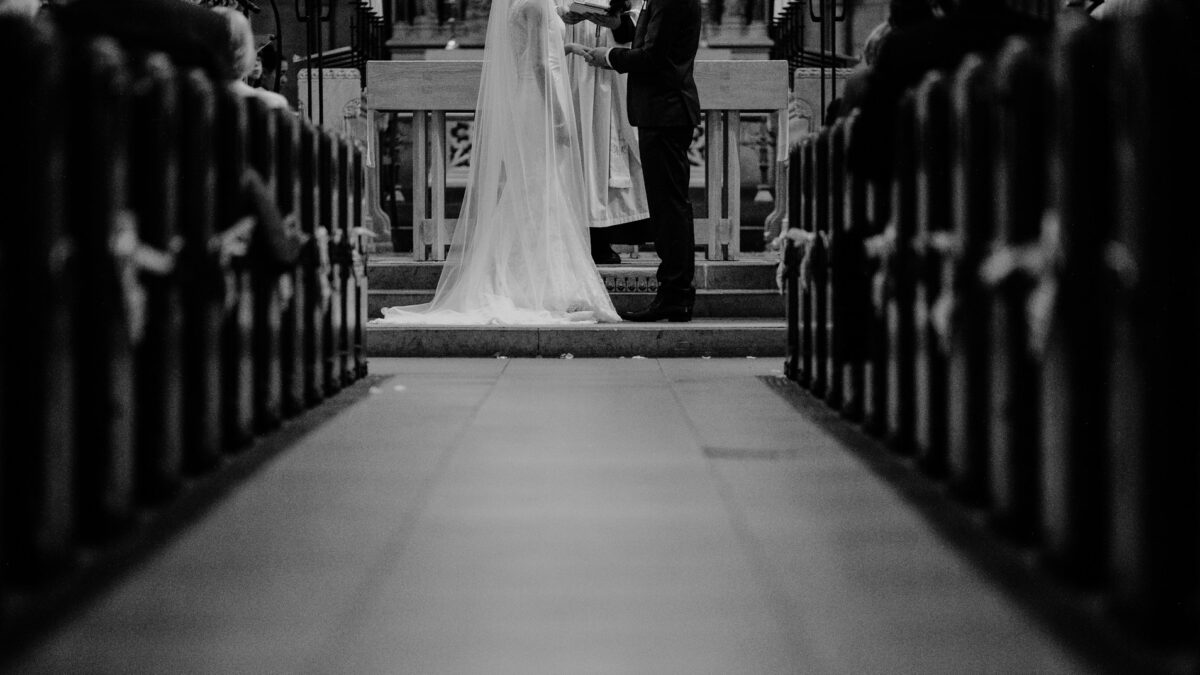In 2006, Elizabeth Gilbert’s bestselling memoir, Eat, Pray, Love, romanticized her decision to leave her husband in search of self-discovery and happiness. In it, she travels to Italy, India, and Indonesia where she finds gustatory, spiritual, and finally romantic fulfillment with her soulmate, a charming 52-year-old Brazilian divorcé named Jose. But that’s not the end of the story.
After 10 years of marriage to Jose, she left him for a new soulmate and quipped, “I don’t think marriage is supposed to be an endurance contest.” In his new book, Get Married, Brad Wilcox, senior fellow at the Institute for Family Studies and director of the National Marriage Project at the University of Virginia, points out, “It’s probably no accident that Gilbert, who has had four ‘soulmates’ since she left her first husband in 2002, is by last count a single fiftysomething.”
In Wilcox’s view, Gilbert’s story is emblematic of a larger pattern of anti-nuptial and anti-natalist messaging from the cultural elites of academia, journalism, and Hollywood.
Defying the Elites
Articles like The Atlantic’s “The Case Against Marriage,” Time’s “Having It All Without Having Children,” and The New York Times’ “Divorce Can Be an Act of Radical Self-Love” glorify individualism, hedonism, and workism, but Wilcox’s data shows traditional commitments such as marriage and religion are more reliable paths to happiness.
Of course, determining cause and effect in social science is always tricky. For instance, Wilcox analyzes that the odds of being very happy increase by 545 percent for people in a “very happy” marriage, while people “very satisfied” with work only saw a 145 percent increase. Thus, he argues, a good marriage is more important than a good job, the exact opposite of how young people prioritize their lives. Yet some pushed back that Wilcox’s claim merely proves happiness is correlated with happiness, not anything special about marriage.
You can imagine an entrenched critic making this sort of case with all of Wilcox’s statistics: “Correlation, not causation!” But Wilcox finds that stably married men in their fifties have 10 times the median assets of their unmarried peers. Is that because marriage promotes responsible fiscal decisions and professional diligence, or do already wealthy couples merely pool their assets?
This view that marriage is essentially an upper-class wealth consolidation technique, rather than an engine of wealth creation and life satisfaction, was recently advanced by Rebecca Traister for The Cut. To her, lower marriage rates among middle-class and working-class couples would increase if the government safety net radically expanded: “You need stability first … expanding social safety nets, strengthening labor laws, changing our tax code, overhauling housing policies, making education affordable, passing paid leave and child care, reimagining the criminal-justice system, restoring reproductive autonomy.” In her view, marriage will continue to be the domain of the affluent and well-educated until the state replaces the family.
Since we will never reach this utopian state, Traister and other determined leftists can continue to deny that marriage has any inherent value. Nevertheless, Wilcox’s thorough research places the burden of proof on the opposition. His analysis consistently supports the traditional approach as the best approach to marriage: combine bank accounts, go on regular date nights, and put “we before me.”
Certain sub-groups create better marriage climates: the affluent and college-educated, yes, but also regular churchgoers, conservatives, and Asian Americans. These groups are more likely to view marriage as family-first rather than a means of self-fulfillment, and they often hold more traditional views on the value of hard work, sexual fidelity, and inherent differences between men and women.
Marriage and the Good Life
Beneath debates over marriage are competing, largely incompatible visions of the good life. Is life about maximizing freedom, professional success, and self-discovery with marriage as an optional capstone event? Or is life about dying to self and making commitments, with marriage often forming the cornerstone of a meaningful life? Conservative and religious people often endorse the latter, while leftists are more likely to endorse the former.
Thus, feminist historian Stephanie Coontz argues that marriage becoming more optional, contingent, and brittle makes it more loving, joyful, and satisfying. Removing stigmas around divorce, pornography, and infidelity makes the choice of marriage freer and richer, so the argument goes. In this vein, Atlantic editor Honor Jones defended divorcing her husband solely on the grounds of self-actualization — “so I could put my face in the wind. So I could see the sun’s glare.” — and experimentation — “Who could I be if I wasn’t his wife? Maybe I would microdose. Maybe I would have sex with women. Maybe I would write a book.”
As you might guess, Wilcox is unconvinced by such claims. The strongest predictor of a high-quality marriage is “perceived partner commitment,” so religious couples who treat their bond as sacred or conservatives who believe “marriage is for life” see boosts in marital quality. Based on data from the 2018 General Social Survey, Wilcox finds that today, only 51 percent of liberals say infidelity is “always wrong” compared to 89 percent of conservatives, and perhaps unsurprisingly, liberals are about 50 percent more likely to report they have had an affair.
Contrary to the steady stream of docudramas that present Christianity as the province of cults and the sex-shaming “purity industrial complex,” couples who regularly attend religious services together report more frequent sex and more sexual satisfaction than their less religious counterparts. Church, not choreplay, is the way to better communication, intimacy, and sex.
In Praise of Parenthood
The marriage rate has fallen almost 65 percent since 1970, and as a result, 2019 marked the first year that the share of prime-aged adults who are single without children exceeded the number who are married with children. Yet all this freedom hasn’t led to a happiness dividend.
Compared to their childless peers, parents today report their lives are less lonely, more meaningful, and happier. Family life naturally offers opportunities to give and receive love as well as share in a bigger purpose. It’s hard to replicate that guiding, loving force in your life through professional pursuits, digital diversions, or a “chosen family.” Wilcox believes the signature happiness move for conservatives (who are happier than liberals) is getting and staying married.
Wilcox closes with some public policy recommendations that include refunding vocational education, increasing the value of the child tax credit, and removing marriage penalties for working-class couples. While these ideas would offer some financial support for families, they are not particularly new, and they ignore the broader cultural challenge.
In their recent book The Genius of Israel, Dan Senor and Saul Singer explain why Israel’s fertility rate is nearly double other developed countries: a bottom-up pro-natalist culture. An Israeli restaurant critic explains, “You know successful people in high-tech have ‘made it’ if they have a lot of children. They have four kids and are proud of the fact that they can afford it. Yachts, private planes, and fancy cars are not the symbol here. … It’s the number of kids.” Israel’s public policy is merely an adaptation to this reality.
Wilcox urges readers to defy the elites, but he dodges on how we could move at a societal level from children as expensive encumbrance to status symbol or how marriage could restore its desirability. Thus, a reader who is blessed with a supportive faith and family community, a stable job, or the brains to be a conservative will have much to be thankful for but little food for thought.









